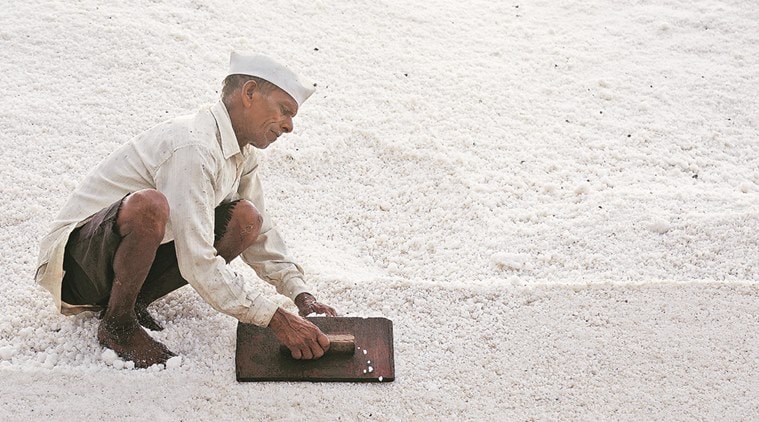 The executive director of Iodine Global Network (IGN), said that the USI program of India is hugely successful and it is important for the whole world as India is one of the largest salt exporters. Representative Image. (Express photo by Nirmal Harindran)
The executive director of Iodine Global Network (IGN), said that the USI program of India is hugely successful and it is important for the whole world as India is one of the largest salt exporters. Representative Image. (Express photo by Nirmal Harindran) India’s salt production is not affected by the Covid-19 pandemic and is adequate to meet the needs, said Dr Pradeep Saxena, senior chief medical officer, nutrition and iodine deficiency disorders cell of the Union health ministry.
Saxena was speaking on the current status of the National Iodine Deficiency Disorder Control Program (NIDDCP) and the success of the Universal Salt Iodisation (USI) programme at a webinar on the 30th National Coalition for Sustained Optimal Iodine Intake (NCSOII) hosted by the association for Indian Coalition for Control of Iodine Deficiency Disorders (ICCIDD), on July 1.
Dr Chandrakant S Pandav, president of ICCIDD, hailed the USI programme in India as the most successful public health story. He also spoke about the Kangra valley study which led to the launch of the National Goitre Control Program (NGCP) to bring down the prevalence of Iodine deficiency disorders. Stating the example of Tamil Nadu State, which had lagged in the USI goals, Dr Saxena said that “taking the state government on board for implementation of NIDDCP has improved the situation”.
Dr Werner Shultink, executive director of Iodine Global Network (IGN), said that the USI program of India is hugely successful and it is important for the whole world as India is one of the largest salt exporters. He emphasised that “the USI framework stays in place and continues to be implemented”.
Dr Rajan Shankar, senior advisor, Tata Trusts, spoke on issues linked to food and nutrition security. “The job is not done yet and there is a need to continue the program to achieve 100% coverage of adequately iodized salt. Keeping in mind the modern dietary patterns of average Indian households there is a need to make sure the processed food industry also uses iodised salt”.
Dr A Laxmaiah, a scientist at Indian Council of Medical Research (ICMR), said, “there is a need for a national level prevalence survey to estimate iodine content in all Indian foods in all the states”.
Throwing light on the salt reduction strategies and hypertension, Dr Bhawna Sharma, country lead, Resolve to Save Lives, said, “reducing sodium intake through salt can reduce the chances of hypertension by 30 per cent. An average Indian adult consumes about 11 gm of salt per day whereas WHO recommends 5 gm per day. There is a need for the implementation of low sodium salt interventions that include dietary habits, taste, functionality, availability, cost and safety”.
- The Indian Express website has been rated GREEN for its credibility and trustworthiness by Newsguard, a global service that rates news sources for their journalistic standards.

